|
|
|
Sort Order |
|
|
|
Items / Page
|
|
|
|
|
|
|
| Srl | Item |
| 1 |
ID:
120061
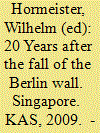

|
|
|
|
|
| Publication |
Singapore, KAS, 2009.
|
| Description |
147p.Pbk
|
| Series |
Panorama Insights into South East Asian and European Affairs
|
|
|
|
|
|
|
|
|
|
|
|
Copies: C:1/I:0,R:0,Q:0
Circulation
| Accession# | Call# | Current Location | Status | Policy | Location |
| 057218 | 943.087/HOR 057218 | Main | On Shelf | General | |
|
|
|
|
| 2 |
ID:
104713
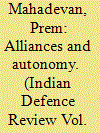

|
|
|
| 3 |
ID:
177949
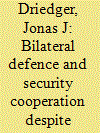

|
|
|
|
|
| Summary/Abstract |
With wavering US support and Brexit unfolding, cooperation between Germany, the EU's economic powerhouse, and the United Kingdom, Western Europe's prime military power, becomes crucial for Europe's overall ability to deal with a resurgent Russia. Does institutional and normative disintegration between states, such as the Brexit process, weaken bilateral security cooperation? This article argues that such cooperation persists if both states continue to jointly perceive a third actor as threatening while regarding each other as useful and reliable when it comes to ameliorating this shared threat. The argument is tested on a case of intrinsic theoretical, historical, and political importance: British-German cooperation towards Russia before and after the 2016 Brexit referendum. The article finds, against a wide pessimist consensus to the contrary, that cooperation strengthened during the Brexit process. As the Ukraine crisis had caused converging threat perceptions since 2014, Brexit incentivised both sides to signal ongoing reliability to each other and, consequently, to view each other as more capable allies. The article combines qualitative comparisons and congruence analysis, drawing data from British, German and Russian primary sources in their respective original languages, including foreign and security policy documents as well as interviews with stakeholders involved in policy formation.
|
|
|
|
|
|
|
|
|
|
|
|
|
|
|
|
| 4 |
ID:
189232
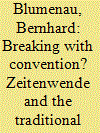

|
|
|
|
|
| Summary/Abstract |
On 27 February 2022, German Chancellor Olaf Scholz addressed the Bundestag and announced a watershed moment (Zeitenwende) for Germany's conduct of foreign affairs. Against the backdrop of the historical pillars of German foreign policy, this article reviews the core implications of the Zeitenwende doctrine. It analyses how the new policy continued or transformed traditional notions underpinning Germany's external relations: Westbindung (integration into the West) and European integration, multilateralism, the pursuit of a rules-based international order and NATO membership, hesitant leadership, Ostpolitik and Wandel durch Handel (transformation through trade), as well as a foreign policy not relying on military means. It argues that Zeitenwende represented a break with some traditional notions, such as Ostpolitik and Wandel durch Handel, and to some extent the non-military foreign policy. However, Zeitenwende also reconfirmed other traditions: Westbindung, a commitment to multilateralism and the rules-based order, as well as the reluctance to assert German leadership. With Zeitenwende, Germany remained firmly committed to the EU and NATO as the country acknowledged that it must do more for its own, and for Europe's, security. Zeitenwende represented Germany's coming to terms with, and final acceptance of, the realities of the post-Cold War European order.
|
|
|
|
|
|
|
|
|
|
|
|
|
|
|
|
| 5 |
ID:
125093
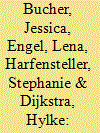

|
|
|
|
|
| Publication |
2013.
|
| Summary/Abstract |
The European Union member states split over the military intervention in Libya with France, Germany and the UK voting differently in the United Nations Security Council. This article compares news media in France and Germany to better understand the foreign policy decisions of these key actors. Using a newspaper analysis of 334 articles, it shows that the German domestic debate started very late and was much less stable than the French debate. This supports arguments that Germany's decision-making was erratic. The analysis, however, also shows that the German debate was comprehensive and included an extensive discussion of the legitimacy of intervention. This fits in well with the traditional reluctance of German foreign policy elites to support military action.
|
|
|
|
|
|
|
|
|
|
|
|
|
|
|
|
| 6 |
ID:
178585
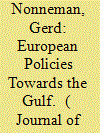

|
|
|
|
|
| Summary/Abstract |
This paper discusses European policies towards the Qatar crisis in the context of the evolution of broader past and present European policies towards the Gulf. It starts with a summary discussion of historical patterns of relations between Europe and the Gulf, before briefly sketching the major changes in the regional environment after the Second World War, beginning with the US supplanting the UK as the dominant hegemon, through to the changes wrought by Trump’s elevation to the US presidency. It then turns to a discussion of the effects of these changes for the Gulf and other regional states and their policy postures, before going on to examine the ways in which European states and the EU have interpreted and reacted to this changing environment. These reactions are often at one and the same time a reaction to the changes and uncertainties in US policy under Trump, since this changing US role is also a crucial ingredient both in the region and for Europe’s room for manoeuvre. Against this background, the paper will outline European policies towards the Gulf theater in particular, focusing on Iran and the JCPOA nuclear deal, and the GCC (or Qatar) crisis –– while also briefly considering the Yemen crisis and the impact of Gulf competition on and in the Libyan theater. From October 2018, the Khashoggi affair added an additional dimension to the crisis, as did the renewed oil price crash amidst the global COVID-19 pandemic beginning in 2020.
|
|
|
|
|
|
|
|
|
|
|
|
|
|
|
|
| 7 |
ID:
088663
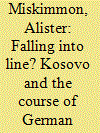

|
|
|
|
|
| Publication |
2009.
|
| Summary/Abstract |
Germany's role in Operation Allied Force has been described as a watershed in its foreign policy. It remains perhaps the pinnacle of Germany's security and defence policy transition after the Cold War. Germany's participation in Operation Allied Force was the first aggressive use of force by the Bundeswehr since the Second World War and, remarkably, was undertaken without a United Nations Security Council mandate. The deployment of German forces in 1999 suggested that German reluctance to burden-share in crisis management alongside NATO allies had been overcome. Yet Germany remains a cautious actor when it comes to the deployment of offensive military force. In this regard, Germany has maintained a considerable degree of continuity in its foreign and security policy after unification, a theme which this article will outline.
|
|
|
|
|
|
|
|
|
|
|
|
|
|
|
|
| 8 |
ID:
145263
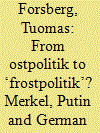

|
|
|
|
|
| Summary/Abstract |
Germany's relationship with Russia has historically been one of the most crucial in shaping Europe's fate. Despite radical transformation in the nature of European Great Power politics, it continues to be pertinent from the perspective of today's world. Germany's willingness to establish good relations with the Soviet Union in the late 1960s—its emphasis on economic relations and cooperation instead of political disagreements—prepared the ground for the end of the Cold War and German unification twenty years later. Germany's basic policy towards Russia remained broadly unchanged despite German unification and changes in the domestic political coalitions and leadership, sometimes against political expectations. In the European context, Germany's attitude towards Russia created the backbone of EU–Russia relations. During 2012–13, however, the continuity in Germany's policy towards Russia was seen as having come to an end. Political twists came to the fore and the atmosphere was loaded with tensions, made worse by the Ukrainian crisis. This article reviews the recent, alleged changes in Germany's policy towards Russia during the Merkel era. It asks two basic questions: first, whether Germany's policy really has changed and if it has, what are the theoretical tools that give us the best potential understanding of these changes? The article argues that the policy has changed, but not as dramatically as made out by some headlines. Moreover, the article suggests that a key element in analysing the degree of change in Germany's policy towards Russia is neither the external power relations nor domestic politics and related changes in the prevailing interpretation of national interest, though these are important too, but the interaction between the leaders and foreign policy elites.
|
|
|
|
|
|
|
|
|
|
|
|
|
|
|
|
| 9 |
ID:
146329
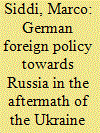

|
|
|
|
|
| Summary/Abstract |
This essay investigates the shift in Germany’s Ostpolitik approach to Russia as a result of the latter’s increasing domestic authoritarianism and assertive foreign policy, particularly its violations of international law in the Ukraine crisis. This prompted Germany to take the initiative in formulating EU sanctions against Russia. However, Germany has attempted to reconcile the sanctions policy with a diplomatic approach to resolving the Ukraine crisis by seeking ways of engaging Moscow on broader security and economic issues, as Russia is considered an essential factor in European and global security and a key energy supplier. Thus, Ostpolitik has not been abandoned altogether; it continues to play a role and shapes the long-term objectives of Germany’s Russia policy.
|
|
|
|
|
|
|
|
|
|
|
|
|
|
|
|
| 10 |
ID:
092903
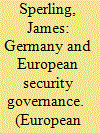

|
|
|
|
|
| Publication |
2009.
|
| Summary/Abstract |
The expansion of the security agenda after the end of the Cold War, propelled by the blowback of 11 September 2001, raises questions about the German ability and willingness to contribute to the regional and global security governance tasks facing Europe and Germany's continuing fidelity to its post-war European avocation. It also calls for a reconsideration of the Birmingham model of foreign policy analysis, particularly its emphasis on (and interpretation of) the ideational and institutional factors defining the German foreign policy agenda and shaping German foreign policy behaviour, at least with respect to the implementation (rather than formulation) of European Union security policies. Towards assessing the continuing utility of the Birmingham model, this article proceeds in three steps: the presentation of the Birmingham model and its restatement as six conjectures; a discussion of the security governance functions undertaken by the EU and the collective action problem facing Europe (and Germany) in executing them; and an empirical investigation of Germany's contribution to the EU as a security actor since 1990.
|
|
|
|
|
|
|
|
|
|
|
|
|
|
|
|
| 11 |
ID:
138184
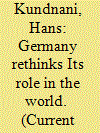

|
|
|
|
|
| Summary/Abstract |
In January 2014, German President Joachim Gauck gave a remarkable speech at the Munich Security Conference in which he exhorted his compatriots to take greater responsibility for solving global problems. He criticized those who “use Germany’s guilt for its past as a shield for laziness or a desire to disengage from the world.” Most controversially in a country that aspires to be a Friedensmacht, or a “force for peace,” he said Germany should “not say ‘no’ on principle” to the use of military force. Polls carried out after the speech suggested that the German public was skeptical—particularly about the use of military force. Although several other leading politicians such as Foreign Minister Frank-Walter Steinmeier and Defense Minister Ursula von der Leyen expressed support for Gauck, Chancellor Angela Merkel remained conspicuously silent.
|
|
|
|
|
|
|
|
|
|
|
|
|
|
|
|
| 12 |
ID:
130725


|
|
|
|
|
| Publication |
2014.
|
| Summary/Abstract |
The German government's 2011 abstention from the United Nations Security Council vote on military intervention in Libya raised questions about Germany's role in the international system. By abstaining, Germany broke with its Western allies and aligned itself with four of the BRICS countries: Brazil, Russia, India and China. Its 'non-Western' act unleashed a debate on the future of German foreign policy. This contribution aims to provide an understanding of Germany's new foreign policy. It characterises some basic political developments, outlines recent German academic debates about the character of German foreign policy and provides an interpretation of the government's New Players Concept ('Shaping Globalization - Expanding Partnerships - Sharing Responsibility'), which was adopted in 2012.
|
|
|
|
|
|
|
|
|
|
|
|
|
|
|
|
| 13 |
ID:
153555
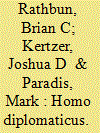

|
|
|
|
|
| Summary/Abstract |
Psychology is traditionally used in political science to explain deviations from rationality. Lost in the debate between rationalists and their critics, however, is a sense of whether the kinds of strategic self-interested behavior predicted by these models has psychological microfoundations: what would homo economicus look like in the real world? We argue that strategic rationality varies across individuals and is characterized by a pro-self social-value orientation and a high level of epistemic motivation. Testing our argument in the context of international relations, we employ a laboratory bargaining game and integrate it with archival research on German foreign policy-making in the 1920s. We find in both contexts that even among those interested in maximizing only their own egoistic gains, those with greater epistemic motivation are better able to adapt to the strategic situation, particularly the distribution of power. Our results build a bridge between two approaches often considered to be antithetical to one another.
|
|
|
|
|
|
|
|
|
|
|
|
|
|
|
|
| 14 |
ID:
186560
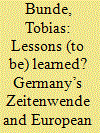

|
|
|
|
|
| Summary/Abstract |
In Germany, the Russian war on Ukraine is widely perceived as a “Zeitenwende,” a watershed moment undermining key foreign policy beliefs. Despite mounting evidence contradicting them, German elites previously failed to adapt core beliefs regarding Russia and the use of force because these beliefs were not only deeply embedded in largely uncontested identity constructions but also shaped the definition of economic interests, which in turn made ideational adaptation more costly. Moreover, Germany’s extraordinarily beneficial geopolitical situation in the post-Cold War era meant that the country could afford not to learn. Although the “Zeitenwende” will trigger significant change, it is unclear which lessons exactly Germans will now be learning and how far that adaptation will go. Given Germany’s key position in Europe and its previous role in shaping the European and transatlantic policy toward Russia, the results of these learning processes will significantly shape the emerging European security order.
|
|
|
|
|
|
|
|
|
|
|
|
|
|
|
|
| 15 |
ID:
138208
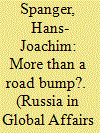

|
|
|
|
|
| Summary/Abstract |
The current chill in East-West relations has, according to perceptions on both sides, one prominent victim: the special German-Russian relationship, which has developed since the end of the Cold War and which in many respects started even earlier. Viewed from Moscow's perspective, it may appear as if Germany has become an integral part of a unified Western front or, worse still, that Germany took on a leading role in the formation of this unified Western stance confronting Russia. According to this perception, a combination of moral principles and geostrategic interests has replaced the pragmatism that for decades prevailed in the German Ostpolitik.
|
|
|
|
|
|
|
|
|
|
|
|
|
|
|
|
| 16 |
ID:
129679
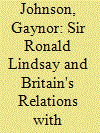

|
|
|
|
|
| Publication |
2014.
|
| Summary/Abstract |
Of the five diplomats who held the post of British ambassador to Berlin during the interwar period, the two-year embassy of Sir Ronald Lindsay, 1926-1928, has received least attention by historians. This article charts three main aspects of Lindsay's career in Berlin. The first of these is his relationship with the Foreign Office, which is consistently good although Treasury comments on his reports about Germany's continuing financial problems expose some of the friction within the British government about how best to deal with the German reparation problem. The second area explored by the article examines Lindsay's views on the "German question," and suggests that the post-Locarno period did not witness a significant growth of trust between Britain, France and Germany on questions concerning international security. Finally, the article examines how Lindsay's thinking about German affairs compares to his predecessor and his successors and explores Lindsay's views about the likely trajectories of German foreign policy.
|
|
|
|
|
|
|
|
|
|
|
|
|
|
|
|
| 17 |
ID:
132921
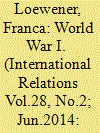

|
|
|
|
|
| Publication |
2014.
|
| Summary/Abstract |
Since the beginning of the investigation into the origins of World War I, it has been claimed by researchers and politicians alike that the 'Great War' could have been averted had German decision makers not misperceived the structures of power. More specifically, it has been argued that German policy makers, while seizing the Bosnian window of opportunity for either preventive or expansionist aims,1 underestimated Great Britain's and Russia's willingness and readiness to intervene in the Sarajevo crisis of 1914.2 As a result, World War I appears to be the result of an accidental failure in deterrence.
|
|
|
|
|
|
|
|
|
|
|
|
|
|
|
|
| 18 |
ID:
132924
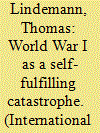

|
|
|
|
|
| Publication |
2014.
|
| Summary/Abstract |
It is a quite common conviction in international relations (IR) theory that what George Kennan called the 'original catastrophe' was predetermined and unavoidable. These explanations of World War I consider the conflict primarily as an inevitable by-product of material structures.1 On the one hand, are those who emphasize the impact of international system's constraints on state behavior - rigid alliances, bipolarization between great powers, the arms race, rivalry dynamics and so on.2 Yet, others regard countries' domestic structures as fundamental component in the outbreak of a diversionary war.3 If taken too far, these approaches can imply that the war was both rational and inevitable in that it was the logical consequence of internal and external tensions. Most importantly, these perspectives fail to take into account leaders' corresponding representations and narratives of 'material' reality and their role on the decision-making process. This essay devotes special attention to the hitherto neglected narrative dimension of World War I.4 In the following, I will propose a new interpretation for German brinkmanship during the July crisis.
|
|
|
|
|
|
|
|
|
|
|
|
|
|
|
|
| 19 |
ID:
195200


|
|
|
|
|
| Summary/Abstract |
Since Russia invaded Ukraine in February 2022, German foreign and security policy has been under intense pressure to adapt to a much more threatening geopolitical setting. Notwithstanding the leadership’s decision to embrace change, the crisis has exposed some persistence in Germany’s antecedent ‘civilian power’ paradigm, or culture of restraint. A culturalist analytical approach finds that durable historical and ideational factors in identity formation, the embeddedness of foreign policy in domestic institutions and the close association of European integration with the core tenets of Germany’s identity constrain its capacity to act decisively and without equivocation, even under dramatically changed circumstances summarised in the concept of Zeitenwende.
|
|
|
|
|
|
|
|
|
|
|
|
|
|
|
|
|
|
|
|
|